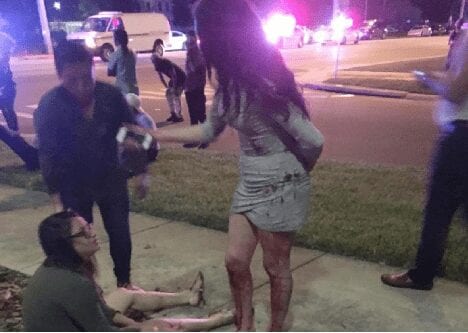U.S. authorities said on Monday they had found no direct links between Islamic State militants and the gunman who killed 49 people at a gay nightclub in Orlando, describing him as a homegrown extremist who was inspired by radical Islamist groups.
Omar Mateen, the perpetrator of the worst mass shooting in modern U.S. history, had expressed support for multiple armed Islamist movements and people, which “adds a little bit to the confusion about his motives,” FBI Director James Comey said.
Mateen, 29, the U.S.-born son of Afghan immigrants, was fatally shot by police who stormed Orlando’s Pulse club with armored cars after a three-hour siege.
“So far, we see no indication that this was a plot directed from outside the United States and we see no indication that he was part of any kind of network,” Comey said in Washington. “We’re highly confident this killer was radicalized at least in some part through the internet.”
The FBI investigated Mateen for 10 months starting in 2013 but found no evidence of a crime or connection with a militant group. During 911 calls during the rampage, Mateen mentioned support for violent Islamist extremists.
Islamic State, which controls territory in Iraq and Syria, reiterated on Monday a claim of responsibility, although it offered no signs to indicate coordination with the gunman.
The rampage reverberated on the presidential campaign trail, where Republican Donald Trump and Democrat Hillary Clinton, likely opponents in the Nov. 8 election, clashed over how to confront violent Islamist extremists.
Trump proposed suspending immigration to the United States from countries with a history of terrorism against America, Europe or U.S. allies, while Clinton warned against demonizing Muslims and called for tougher gun safety measures.
The Orlando killings followed the massacre of 14 people in San Bernardino, California, last year and raised the question of whether the United States would have to confront jihadist attacks in the homeland for years to come.
Comey said tracking lone wolf attackers like Mateen was like finding “needles in a nationwide haystack” while also trying to work out what kind of people could become radicalized.
The Florida rampage began about 2 a.m. on Sunday (0600 GMT) when the club was packed with some 350 revelers at a Latin music night. Many fled as the gunman raked the crowd with bullets from an AR-15-style semiautomatic rifle and a pistol.
An initial wave of officers charged into the club and trapped Mateen in a bathroom, Orlando Police Chief John Mina told reporters. That allowed many patrons to flee, although others were trapped in the restroom with Mateen, leading to a standoff.
“We were able to save and rescue dozens and dozens of people,” Mina said. Police negotiated with Mateen for about three hours before breaking a hole in the wall, which allowed hostages to escape.
Mateen also emerged from the hole and was shot to death by officers, police said.
Officials said on Sunday the death toll was 50. On Monday, they clarified that the figure included Mateen. Some 53 people were wounded and 29 remain hospitalized at Orlando Regional Medical Center, the hospital said on Twitter.
LAUGHTER AND GUNFIRE
Pastor Deyni Ventura of Sanford said she visited a survivor in the hospital, whom she identified only as Norman, who had taken refuge in a handicapped bathroom stall crammed with 30 people.
He could hear the shooter laughing loudly as he sprayed gunfire over and under the bathroom stall. “They couldn’t see the shooter but they could hear him laughing,” Ventura said, intimating a loud cackling laugh.
Norman, who was shot four times, crawled over the bodies of his friends to safety. Everyone else in the stall died, Ventura said.
“He told his friends to leave but they were scared and stayed in the stall – and all died,” she said.
Other family members were desperate for news about their missing loved ones.



